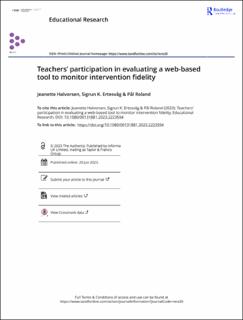Teachers’ participation in evaluating a web-based tool to monitor intervention fidelity
Peer reviewed, Journal article
Published version

Permanent lenke
https://hdl.handle.net/11250/3072703Utgivelsesdato
2023Metadata
Vis full innførselSamlinger
Originalversjon
Halvorsen, J., Ertesvåg, S.K. & Roland, P. (2023) Teachers’ participation in evaluating a web-based tool to monitor intervention fidelity, Educational Research 10.1080/00131881.2023.2223594Sammendrag
Background
When educational interventions are carried out, it is important that they are undertaken in a way that is aligned with the intervention plan: in other words, that they demonstrate fidelity to the intervention. A significant research issue is how fidelity can be monitored in a time-efficient and cost-effective way in classrooms and whether technology could help to provide innovative solutions in this regard.
Purpose
Through collaboration with teachers, this exploratory study sought to ascertain the usability of a web-based fidelity application (WFA). The WFA was being developed as a checklist tool to help teachers monitor the implementation fidelity of a social and emotional learning intervention for 14- to 15-year-old students in Norway.
Method
For this qualitative study, data were collected at two time points: (i) through a focus group interview with six teachers who had piloted the WFA prior to the initiation of the intervention; and (ii) via individual interviews with five teachers in the intervention group who had used the WFA during the implementation process. The data were analysed thematically.
Findings
According to the analysis, the teachers considered that the WFA’s features (e.g. layout and registration process) could help support the ease and efficiency of fidelity reporting. They felt that it provided a highly recognisable link with the intervention material. In addition, the teachers provided ideas for further development and potential improvements. In all, the WFA was perceived as having high usability, suggesting its potential value as a useful tool for the collection of fidelity data.
Conclusion
This paper highlights the crucial role of teacher participation and the importance of fidelity data in the conduct of educational interventions. It draws attention to the need for user-friendly tools to support teachers to monitor fidelity in ways that do not involve high time and cost burdens. Similar WFAs could be of potential use in many different kinds of educational interventions in classroom settings internationally.
